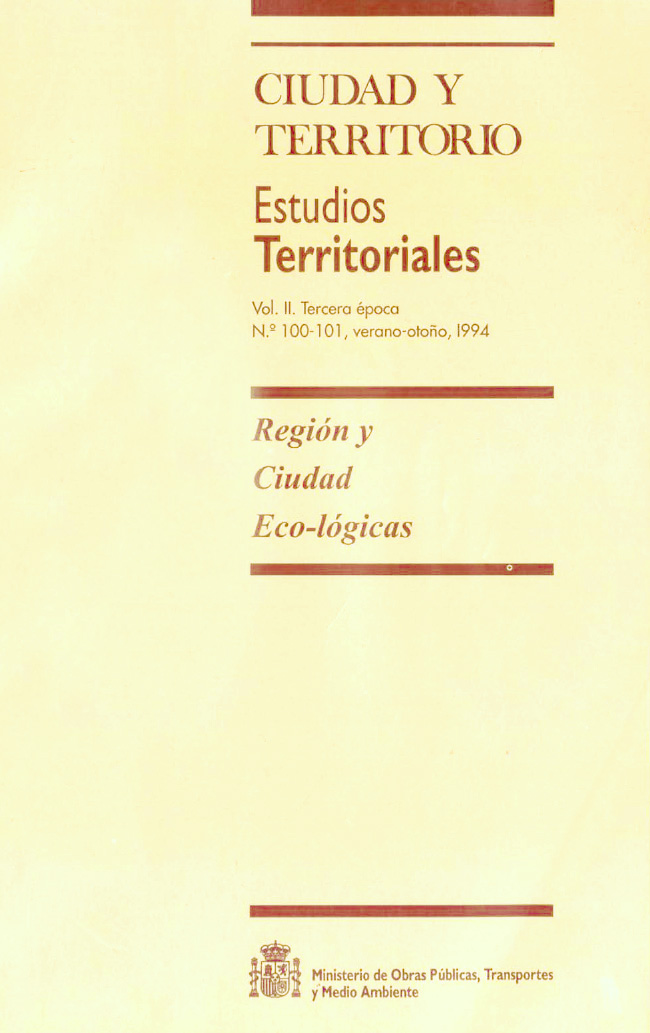Ecological Urban Restructuring. Theoretical Foundation and concept for action
Abstract
Cities are «built thought». They represent the most materialized form of the relation between society and environment. Cities worldwide have become a symbol of the environmental crisis because they transform valuable nature resources into waste and pollutants. Cities, however, are also places of innovation. Solutions emanate from people whose living conditions are threatened. Many signs indicate that the time is ripe for basic changes in production and consumption processes, in people's attitudes and behaviour, and also in the built-up structures of cities. The concept of Ecological Urban Restructuring has been theoretically developed and empirically tested in an international comparative research project. The four elements of the concept are the following: a. ((Eight ecological orientations» were compiled as guidelines for concrete projects, strategies and measures. b..4 «model of fields of activity and building blocks» was developed as a thinking and working aid to overcome the concentration between sectorally oriented conventional planning and policies, and the necessary new integrated thought and action. c. The «conception of ecological neighbourhood development» refers to neighbourhoods as to be the most important level of action for the ecoligical urban restructuring. d. The «concept of eco-stations». Eco-stations are an infrastructural prerequisite for ecological urban restructuring. They should be ecologically oriented communication, culture and trade centers which are communally supported.
Downloads
Downloads
Published
How to Cite
Issue
Section
License
Copyright (c) 1994 Ekhart Hahn

This work is licensed under a Creative Commons Attribution-NonCommercial-NoDerivatives 4.0 International License.
Considering the provisions of the current legislation on Intellectual Property, and in accordance with them, all authors publishing in CyTET give -in a non-exclusive way and without time limit- to the Ministry of Transport, Mobility and Urban Agenda the rights to disseminate, reproduce, communicate and distribute in any current or future format, on paper or electronic, the original or derived version of their work under a Creative Commons Attribution-NonCommercial-NoDerivative 4.0 license International (CC BY-NC-ND 4.0), as well as to include or assign to third parties the inclusion of its content in national and international indexes, repositories and databases, with reference and recognition in any case of its authorship.
In addition, when sending the work, the author(s) declares that it is an original work in which the sources that have been used are recognized, committing to respect the scientific evidence, to no longer modify the original data and to verify or refute its hypothesis. Author(s) also declare that the essential content of the work has not been previously published nor will it be published in any other publication while it is under evaluation by CyTET; and that it has not been simultaneously sent to another journal.
Authors must sign a Transfer of Rights Form, which will be sent to them from the CyTET Secretariat once the article is accepted for publication.
With the aim of promoting the dissemination of knowledge, CyTET joins the Open Journal Access (OA) movement and delivers all of its content to various national and international indexes, repositories and databases under this protocol; therefore, the submission of a work to be published in the journal presupposes the explicit acceptance by the author of this distribution method.
Authors are encouraged to reproduce and host their work published in CyTET in institutional repositories, web pages, etc. with the intention of contributing to the improvement of the transfer of knowledge and the citation of said works.








 Enlace a CyTET en Linkedin
Enlace a CyTET en Linkedin